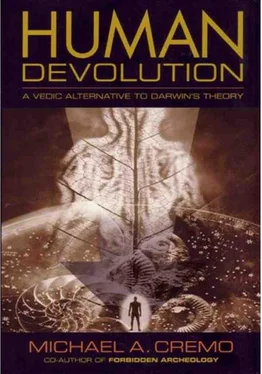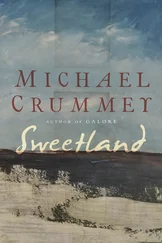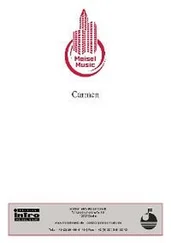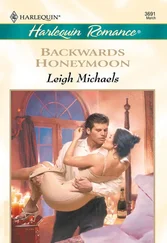Michael Cremo - Human Devolution - A Vedic Alternative To Darwin's Theory
Здесь есть возможность читать онлайн «Michael Cremo - Human Devolution - A Vedic Alternative To Darwin's Theory» весь текст электронной книги совершенно бесплатно (целиком полную версию без сокращений). В некоторых случаях можно слушать аудио, скачать через торрент в формате fb2 и присутствует краткое содержание. Год выпуска: 2003, ISBN: 2003, Издательство: Torchlight Publishing, Жанр: Старинная литература, на английском языке. Описание произведения, (предисловие) а так же отзывы посетителей доступны на портале библиотеки ЛибКат.
- Название:Human Devolution: A Vedic Alternative To Darwin's Theory
- Автор:
- Издательство:Torchlight Publishing
- Жанр:
- Год:2003
- ISBN:9780892133345
- Рейтинг книги:4 / 5. Голосов: 1
-
Избранное:Добавить в избранное
- Отзывы:
-
Ваша оценка:
- 80
- 1
- 2
- 3
- 4
- 5
Human Devolution: A Vedic Alternative To Darwin's Theory: краткое содержание, описание и аннотация
Предлагаем к чтению аннотацию, описание, краткое содержание или предисловие (зависит от того, что написал сам автор книги «Human Devolution: A Vedic Alternative To Darwin's Theory»). Если вы не нашли необходимую информацию о книге — напишите в комментариях, мы постараемся отыскать её.
Human Devolution: A Vedic Alternative To Darwin's Theory — читать онлайн бесплатно полную книгу (весь текст) целиком
Ниже представлен текст книги, разбитый по страницам. Система сохранения места последней прочитанной страницы, позволяет с удобством читать онлайн бесплатно книгу «Human Devolution: A Vedic Alternative To Darwin's Theory», без необходимости каждый раз заново искать на чём Вы остановились. Поставьте закладку, и сможете в любой момент перейти на страницу, на которой закончили чтение.
Интервал:
Закладка:
“the Scientific Aspect of the Supernatural”
In 1866, Wallace published in a periodical an extended explanation of spiritualism called “The Scientific Aspect of the Supernatural.” The heart of the essay was a summary of scientifically documented evidence for psychical phenomena, such as spirit messages. Wallace later brought out the essay in booklet form, and sent it to many of his scientific friends and acquaintances.
Thomas Henry Huxley, who received a copy, replied: “I am neither shocked nor disposed to issue a Commission of Lunacy against you. It may all be true, for anything I know to the contrary, but really I cannot get up any interest in the subject. I never cared for gossip in my life, and disembodied gossip, such as these worthy ghosts supply their friends, is not more interesting to me than any other. As for investigating the matter—I have half a dozen investigations of infinitely greater interest to me
—to which any spare time I may have will be devoted. I give it up for the same reason I abstain from chess—it’s too amusing to be fair work and too hard work to be amusing” (Wallace 1905, v. 2, p. 280).
Wallace did not object to Huxley spending his time on research of his own choice, but he did protest Huxley’s denigration of his work. “The objection as to ‘gossip’ was quite irrelevant as regards a book which had not one line of ‘gossip’ in it, but was wholly devoted to a summary of the evidence for facts—physical and mental—of a most extraordinary character, given on the testimony of twenty-two well-known men, mathematicians, astronomers, chemists, physiologists, lawyers, clergymen, and authors, many of world-wide reputation” (Wallace 1905, v. 2, p. 280). In his booklet, Wallace (1896, pp. 35–36) had listed them as: “Prof. A. De Morgan, mathematician and logician; Prof. Challis, astronomer; Prof. Wm. Gregory, M. D., chemist; Prof. Robert Hare, M. D., chemist; Prof. Herbert Mayo, M. D., F. R. S., physiologist; Mr. Rutter, chemist; Dr. Elliotson, physiologist; Dr. Haddock, physician; Dr. Gully, physician; Judge Edmonds, lawyer; Lord Lyndhurst, lawyer; Charles Bray, philosophical writer, Archbishop Whately, clergyman; Rev. W. Kerr, M. A., clergyman; Col. E. B. Wilbraham, military man; Sir Richard Burton, explorer, linguist, and author; Nassau E. Senior, political economist; W. M. Thackeray, author; T. A. Trollope, author; R. D. Owen, author and diplomatist; W. Howitt, author; S. C. Hall, author.”
In another exchange with Huxley, Wallace pointed out that most people who daily depart this world are addicted to gossip. One should not therefore expect that their communications with earthbound friends should provide examples of the most polished discourse (Wallace 1874; in Smith 1991, pp. 90–91).
Dr. John D. Tyndall wrote to Wallace about his spiritualist publication: “I see the usual keen powers of your mind displayed in the treatment of this question. But mental power may show itself, whether its material be facts or fictions. It is not lack of logic that I see in your book, but a willingness that I deplore to accept data which are unworthy of your attention. This is frank—is it not?” (Wallace 1905, v. 2, p. 281).
Another scientist who received Wallace’s pamphlet “The Scientific Aspect of the Supernatural” was A. De Morgan, professor of mathematics at University College. Already a spiritualist, De Morgan wrote a letter to Wallace, warning him to expect difficulties in demonstrating spiritualistic effects to scientists. “There is much reason to think,” wrote De Morgan “that the state of mind of the inquirer has something—be it internal or external—to do with the power of the phenomena to manifest themselves. . . . Now the man of science comes to the subject in utter incredulity of the phenomena, and a wish to justify it. I think it very possible that the phenomena may be withheld. In some cases this has happened, as I have heard from good sources” (Wallace 1905, v. 2, p. 284).
Wallace nevertheless invited leading scientists and other learned persons to witness spiritualist phenomena, advising them that several sittings would be required. This seems reasonable, because most experimental work in science does require repeated trials. Dr. W. B. Carpenter and Dr. John Tyndall came for one sitting each, during which only very mild, unimpressive phenomena occurred. They refused Wallace’s requests to attend more sittings (Wallace 1905, v. 2, pp. 278–279). Most scientists refused to come at all. G. H. Lewes, for example, was “too much occupied and too incredulous to give any time to the inquiry” (Wallace
1905, v. 2, p. 279).
Although Lewes refused Wallace’s invitations to examine spiritualistic phenomena, he wrote to the Pall mall Gazette (May 19, 1868) putting forth accusations against mediums and spiritualists. Amazingly, Lewes wrote that scientists were never allowed to investigate the phenomena. Wallace replied in a letter to the editor that this was not true. For example, Cromwell Varley, an electrical engineer, had been allowed to test the medium Daniel Dunglass Home, with results favorable to the authenticity of his paranormal phenomena. But the journal’s editor refused to publish the letter (Wallace 1905, v. 2, p. 282).
Around this same time, Tyndall had called for a single test demonstration that would prove once and for all the reality or falsity of spiritualistic phenomena. Wallace replied in a letter to Tyndall that one test, even if successful, would not suffice to convince opponents. Wallace thought it better to amass reports of the numerous credible cases already on record. And to these he added, in his letter to Tyndall, one of his own experiences: “The place was the drawing-room of a friend of mine, a brother of one of our best artists. The witnesses were his own and his brother’s family, one or two of their friends, myself, and Mr. John Smith, banker, of Malton, Yorkshire, introduced by me. The medium was Miss Nichol. We sat round a pillar-table in the middle of the room, exactly under a glass chandelier. Miss Nichol sat opposite me, and my friend, Mr. Smith, sat next her. We all held our neighbour’s hands, and Miss Nichol’s hands were both held by Mr. Smith, a stranger to all but myself, and who had never met Miss N. before. When comfortably arranged in this manner the lights were put out, one of the party holding a box of matches ready to strike a light when asked.
“After a few minutes’ conversation, during a period of silence, I heard the following sounds in rapid succession: a slight rustle, as of a lady’s dress; a little tap, such as might be made by setting down a wineglass on the table; and a very slight jingling of the drops of the glass chandelier. An instant after Mr. Smith said, ‘Miss Nichol is gone.’ The matchholder struck a light, and on the table (which had no cloth) was Miss Nichol seated in her chair, her head just touching the chandelier. . . . Mr. Smith assured me that Miss Nichol simply glided out of his hands. No one else moved or quitted hold of their neighbour’s hands. There was not more noise than I described, and no motion or even tremor of the table, although our hands were upon it. You know Miss N.’s size and probable weight, and can judge of the force and exertion required to lift her and her chair on to the exact centre of a large pillar-table, as well as the great surplus of force required to do it almost instantaneously and noiselessly, in the dark, and without pressure on the side of the table, which would have tilted it up. Will any of the known laws of nature account for this?” (Wallace 1905, v. 2, pp. 291–293).
If the facts were as Wallace reported them, it would seem that Miss Nichol herself could not have managed to place herself on the table. If all present at the table were holding hands and did not let go, it would seem that none of them could have lifted Miss Nichol in her chair. That leaves confederates as a possibility. But they should have been exposed by the struck match. Furthermore, it seems any attempt to lift Miss Nichol in complete darkness, either by persons at the table or confederates from outside the room, would have caused much more noise than reported by Wallace. One can only propose that Wallace himself gave a false report. This, however, seems unlikely.
Читать дальшеИнтервал:
Закладка:
Похожие книги на «Human Devolution: A Vedic Alternative To Darwin's Theory»
Представляем Вашему вниманию похожие книги на «Human Devolution: A Vedic Alternative To Darwin's Theory» списком для выбора. Мы отобрали схожую по названию и смыслу литературу в надежде предоставить читателям больше вариантов отыскать новые, интересные, ещё непрочитанные произведения.
Обсуждение, отзывы о книге «Human Devolution: A Vedic Alternative To Darwin's Theory» и просто собственные мнения читателей. Оставьте ваши комментарии, напишите, что Вы думаете о произведении, его смысле или главных героях. Укажите что конкретно понравилось, а что нет, и почему Вы так считаете.












